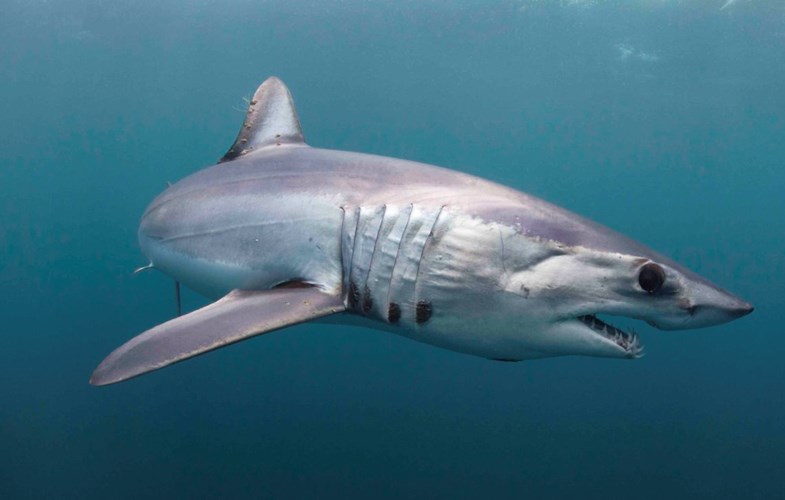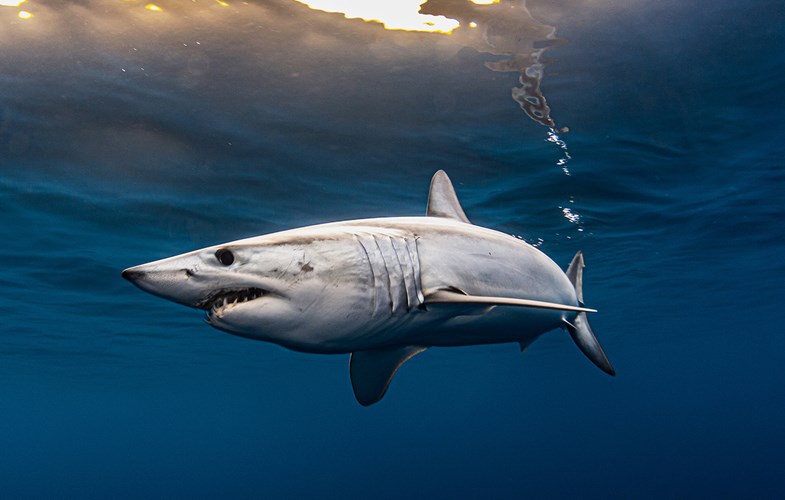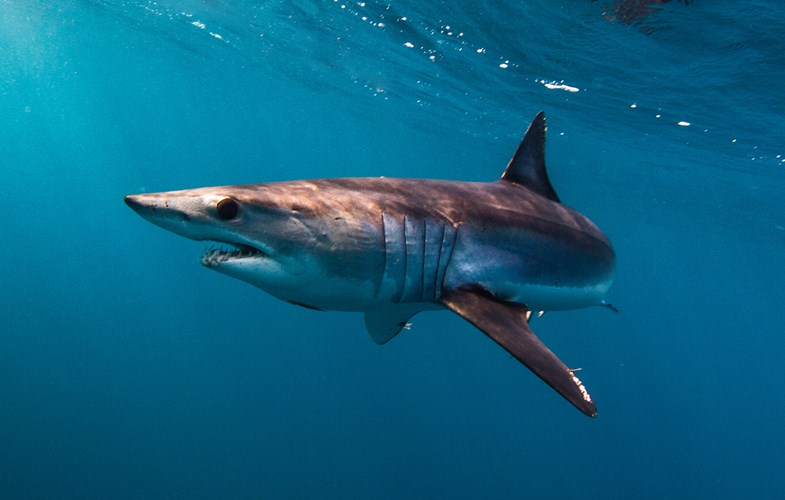

The Mako shark could be saved by decisive protective measures in the Atlantic. But the EU Commission is blocking.
Retention ban for Mako
The fastest shark in the world is threatened with extinction
SOS for the mako shark: It is undisputed among scientists and fisheries experts that the fast top predators are severely endangered by decades of overfishing. For example, the mako is at the top of the list of species threatened by overfishing in the Atlantic by ICCAT, the International Commission for the Conservation of Atlantic Tunas, which is also responsible for the sustainable management of shark stocks there.
Nevertheless, the European fishing industry continues to generate good revenues year after year from the marketing of these sharks, which are caught as a regular by-catch in swordfish, tuna, and blue shark fisheries. In the USA and South Africa, makos are considered the challenge by sport fishermen. Their fins are highly traded in Asia, but their meat is also sought after. Often, mako meat is wrongly declared as “swordfish” and ends up on Central European plates. This has serious consequences: Makos are the fastest sharks in the high seas. As top predators, they play a crucial role in the marine ecosystem. In the North Atlantic, the stock of mako sharks is already completely overexploited, and a similar development is also emerging in the South Atlantic.
“First and foremost, the EU must now pull the emergency brake,” says Iris Ziegler of Sharkproject. Scientific calculations confirm that it may well take half a century for the mako stock to recover from overfishing. “But only if decisive action is taken now and a complete ban on fishing and landings is finally decided and enforced,” says Ziegler. Mako sharks reproduce only slowly. Only at the age of 20, for example, does a female become sexually mature. Mako sharks only have offspring every two to three years. “There is still a chance that this population will recover,” says Ziegler. “It simply must no longer be worthwhile for fishermen to keep the sharks on board as by-catch. When a mako is hooked, it must be released immediately, whether dead or alive. We need not only a complete ban on fishing, but also a complete ban on landing makos.” This is because sharks are allowed to be kept on board as by-catch and sold if they are already dead when the lines are hauled in. Often, makos that are still alive are either declared dead or people wait until they have died in agony before hauling in the line so that they can still make money from them.
Despite all the demands to change this, the EU Commission has so far only blocked and mainly follows the arguments of the fishing industry. Countries such as Canada have shown that there is another way: without waiting for other Atlantic countries, Canada has already introduced a complete landing ban for mako sharks in 2019.
The EU Commission, however, is blocking the Canadian proposal for a landing ban at the International Commission for the Conservation of Atlantic Tunas (ICCAT), which is also responsible for the protection of sharks. The EU Commission still demands a catch quota of 500 tonnes. It claims the largest part of this for itself, namely 288 tonnes. Scientists agree that only an absolute ban on catching and landing sharks can bring the stock in the Atlantic back to a healthy level.
Sharkproject is not letting up: Together with other species protection organizations, Sharkproject is putting pressure on the EU Commission, informing members of the EU Parliament and also calling on the German government to advocate within the EU for a complete ban on catching and landing mako sharks in the North Atlantic and at least a catch limit for the South Atlantic. “It would be bad enough if another species disappeared forever with the mako. But if this top predator can no longer fulfil its function in the sea, the entire ecosystem is also in danger,” says Ziegler.
Goal
What SHARKPROJECT wants:
- An immediate ban on catches and landings of shortfin mako shark in the North Atlantic
- a maximum catch of less than 2001 t for shortfin mako sharks in the South Atlantic from 2022 onwards.
- The by-catch of mako sharks is still far too high. Therefore, SHARKPROJECT advocates for effective measures against by-catch. Sharks that are nevertheless caught must be released as gently and quickly as possible.
- The fishery must be better controlled by more observers on the fishing boats and electronic monitoring systems. This is the only way to protect the animals effectively.
- A new stock assessment for shortfin mako sharks in the North and South Atlantic should be carried out by 2024 at the latest.
Location
- North and South Atlantic
- Action is needed by:
- the Commissioner for Fisheries in the EU, Virginius Sinkevijius;
- the Head of Delegation for the EU to ICCAT, Anders Jessen;
- the governments of each EU Member State;
- and ICCAT as a whole and
- the Regional Fisheries Management Authorities.
Duration
- SHARKPROJECT will not give up until the threatened shortfin mako shark population in the Atlantic can recover.
The long struggle for the protection of the mako shark
2017: The Scientific Committee of the International Commission for the Conservation of Atlantic Tunas (ICCAT) reports that the stock in the North Atlantic is 90 per cent likely to be overfished and therefore recommends a total ban on landings of mako shark for the North and a catch limit for the South.
2019: Due to their threat, mako sharks are listed under the Washington Convention on International Trade in Endangered Species (CITES). Since then, the global trade and import of mako sharks from the high seas is only permitted if the animals have been fished “sustainably”. This requires official confirmation that the catch is made in a region without endangering the local population.
The IUCN (International Union for the Conservation of Nature) upgraded the status of the mako shark from endangered to threatened.
Early 2021: Spain and Portugal ban the import of mako sharks from international waters of the North Atlantic. Landings from national waters and the South Atlantic remain permitted.
From 15 November 2021, there is the next opportunity to do more for the protection of mako sharks: the International Commission for the Conservation of Atlantic Tunas meets.
Observer status ICCAT
We are an accredited observer to ICCAT and attend all meetings.
Partners
We work closely with all marine and species conservation organizations on this.
All proposals and demands of SHARKPROJECT as well as the letters to the German Ministry of Food and Agriculture (BMEL) and to EU Commissioner Sinkevijius are available on our press page
https://www.sharkproject.org/presse/
Link to the webinars on YouTube.
https://www.youtube.com/c/SHARKPROJECTInternationaleV/videos
Project history
03-08-2020: Urgent call for action to the German Federal Government (Ministry of Environment, Ministry of Agriculture) by Sharkproject and 18 other marine and species conservation NGOs from German-speaking countries.
04-09-2020: Letter from Sharkproject and 31 other marine and species conservation NGOs from across Europe to EU Fisheries Commissioner Virginiijus Sinkevicius urging better protection for mako sharks.
September 2020: Sharkproject, together with the Shark League for the Atlantic and the Meditaraenan, is organising a webinar on the situation of the mako shark in the Atlantic.
November/December 2020: Sharkproject attends the ICCAT Commission meeting as an observer and reiterates its position in several statements.
11-05-2021: Sharkproject, together with Pro Wildlife and Humane Society International, organized a webinar on the protection of mako sharks by the EU. Thanks to the support of EU Parliamentarian Francesco Guerreiro, key decision-makers from the Commission and the EU Parliament also participated.
12-05-2021: Press release "EU blocks recovery of highly endangered mako sharks in the Atlantic".
06 till 08-07-2021: Sharkproject participates in the meeting of the relevant committee (Panel 4) at ICCAT and again calls on all delegations to finally support Canada's proposal and thus enable at least a 70% probability of stock rebuilding in the North Atlantic by 2070.
03 till 11-09-2021: At the International Union for Conservation of Nature (IUCN) Congress, Sharkproject is again promoting the urgent protection of the mako shark




